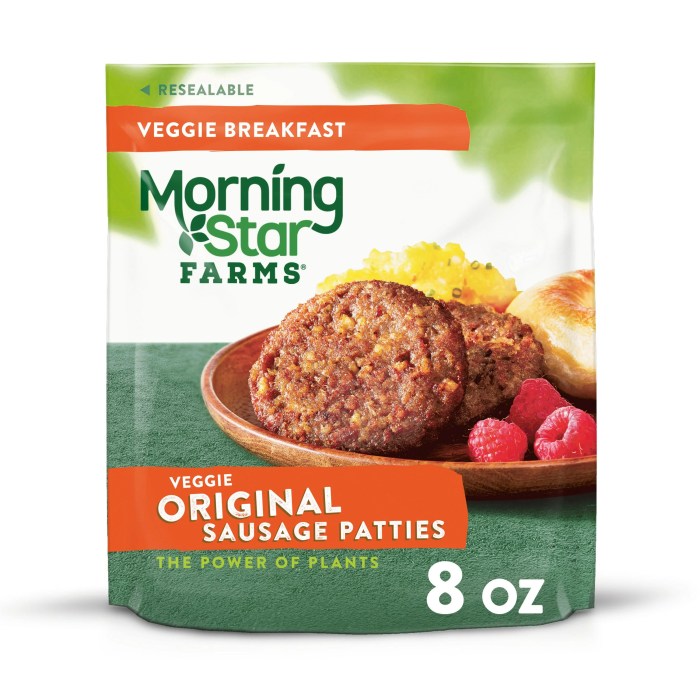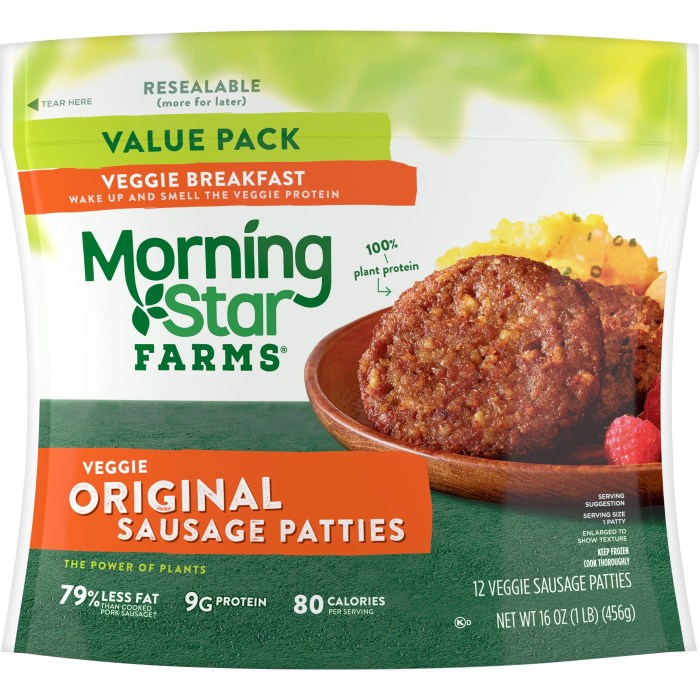Introduction to Morning Star Veggie Patties
Morning star veggie patty nutrition facts – Morning Star Farms, a subsidiary of Kellogg’s, holds a significant position within the burgeoning vegetarian and vegan food market. Established decades ago, the brand has played a key role in making plant-based protein options more accessible and palatable to a wider consumer base, moving beyond niche markets and into mainstream grocery stores. Their success is largely attributed to their consistent innovation in mimicking the taste and texture of traditional meat products, thereby appealing to both committed vegetarians/vegans and those seeking to incorporate more plant-based meals into their diets.The company offers a diverse range of veggie patties, catering to various tastes and dietary needs.
These products go beyond simple bean-based patties, incorporating a wide variety of ingredients to create distinct flavor profiles. From classic garden veggie patties to those featuring bolder flavors like black bean or spicy chipotle, Morning Star Farms provides options that cater to a broad spectrum of preferences. The availability of different patty sizes and formats, such as individual patties or larger family-sized packs, further enhances consumer choice and convenience.
Morning Star veggie patties are a pretty good source of protein, right? But I was curious about the nutritional breakdown compared to other things, so I checked out the kin euphorics nutrition facts to see how they stacked up. Turns out, the veggie patties are lower in sugar, which is cool. Guess I’ll stick with my Morning Star for now, though!
Morning Star Veggie Patty Product Range and Target Market
Morning Star Farms targets a broad demographic, encompassing individuals and families actively seeking vegetarian, vegan, or flexitarian options. This includes consumers motivated by health concerns, environmental consciousness, ethical considerations regarding animal welfare, or simply a desire for culinary variety. The brand’s accessibility – available in most major supermarkets – contributes to its wide reach. The affordability of Morning Star Farms products also positions them as a viable alternative to more expensive meat substitutes, making them attractive to budget-conscious consumers.
The various patty types are designed to meet diverse preferences, from those seeking a familiar “burger” experience to those looking for more unique and flavorful plant-based options. The consistent availability and recognizable branding further contribute to their appeal.
Nutritional Content Breakdown
Morning Star Farms veggie patties offer a convenient plant-based protein source, but their nutritional profile warrants careful examination. Understanding the macro and micronutrient content, and comparing it to other vegetarian options, allows for informed dietary choices. This analysis focuses on a single serving, typically one patty, to provide a clear nutritional benchmark. Nutritional values can vary slightly depending on the specific product and flavor.
| Nutrient | Amount per Patty (Approximate) | % Daily Value (DV) (Approximate) | Comparison to Other Sources |
|---|---|---|---|
| Calories | 120-150 | 6-8% | Comparable to black bean burgers, lower than some tofu burgers. |
| Total Fat (g) | 7-9 | 9-12% | Lower than many tofu burgers, similar to some black bean burgers. |
| Saturated Fat (g) | 1-2 | 5-10% | Generally lower than other vegetarian options. |
| Cholesterol (mg) | 0 | 0% | Naturally cholesterol-free, a benefit of plant-based protein. |
| Sodium (mg) | 300-400 | 13-17% | Can be higher than some alternatives; check for lower sodium options. |
| Total Carbohydrate (g) | 15-20 | 5-7% | Comparable to other veggie burgers. |
| Dietary Fiber (g) | 3-5 | 12-20% | A good source of fiber, contributing to digestive health. |
| Total Sugars (g) | 2-4 | Variable, check product label. | Generally lower than many processed foods. |
| Protein (g) | 7-9 | 14-18% | Comparable to black bean burgers, lower than some tofu burgers. |
| Vitamins & Minerals | Variable; often fortified with iron and B vitamins. Check product label for specifics. | Variable | Nutritional content varies depending on ingredients and fortification. |
Nutritional Benefits and Drawbacks of Regular Consumption, Morning star veggie patty nutrition facts
Regular inclusion of Morning Star veggie patties in a balanced diet can offer benefits such as increased fiber intake, contributing to improved digestive health and satiety. The patties also provide a source of plant-based protein, which is beneficial for individuals seeking to reduce their meat consumption or follow a vegetarian/vegan diet. However, the relatively high sodium content should be considered, particularly for individuals with hypertension or sodium sensitivity.
Over-reliance on processed veggie patties as a primary protein source may limit the intake of other essential nutrients found in whole, unprocessed foods. A balanced approach incorporating diverse plant-based protein sources, fruits, vegetables, and whole grains is recommended for optimal nutritional intake.
Ingredient Analysis

Morning Star Farms veggie patties, while varying slightly depending on the specific flavor, generally contain a core set of ingredients. Understanding these components is crucial for consumers assessing nutritional value, potential allergens, and production processes. This analysis focuses on a standard Morning Star Farms veggie patty to provide a representative overview.
The ingredient list typically includes a blend of vegetables, grains, and binding agents. The exact proportions and specific ingredients may vary depending on the flavor profile (e.g., garden, black bean, etc.). However, common components offer insights into the product’s composition and potential impact on consumers.
Key Ingredients and Their Sourcing
Several key ingredients contribute significantly to the texture, flavor, and nutritional profile of Morning Star Farms veggie patties. Their sourcing and processing methods play a role in the final product’s quality and sustainability.
- Soy Protein Concentrate: A common ingredient providing protein and structure. Sourcing typically involves large-scale soybean cultivation, often employing genetically modified (GMO) soybeans. Processing involves extraction of protein from soybeans, resulting in a concentrated powder used as a binder.
- Water: A crucial component for texture and processing. The source is typically municipal water, subject to local regulations and quality standards.
- Vegetables: A variety of vegetables contribute to flavor and nutritional content. These often include peas, carrots, and corn. Sourcing involves agricultural production, potentially encompassing different farming practices and geographical locations. Processing involves cleaning, chopping, and potentially other preservation methods before inclusion in the patty.
- Textured Vegetable Protein (TVP): Derived from soybeans, TVP adds texture and bulk to the patties. Similar to soy protein concentrate, its sourcing relies on soybean cultivation, often GMO, and processing involves extrusion and drying to create a textured product.
- Other Ingredients: These may include various flavor enhancers, spices, and preservatives to ensure shelf-life and palatability. Specific ingredients and their sources can vary considerably.
Potential Allergens
Consumers with allergies must carefully examine the ingredient list as Morning Star Farms veggie patties contain potential allergens.
- Soy: A major component in many varieties, posing a risk to individuals with soy allergies.
- Wheat: Some formulations may contain wheat gluten as a binder or in other ingredients. This is a significant allergen for those with celiac disease or wheat sensitivities.
- Other potential allergens: Depending on the specific patty flavor, other allergens might be present. These could include nuts, dairy, or other ingredients that should be checked on the individual product label.
Impact on Health and Diet: Morning Star Veggie Patty Nutrition Facts

Morning Star veggie patties, while offering a convenient plant-based protein source, present a complex picture regarding their impact on health and diet. Their nutritional profile, while varying across different product lines, generally contributes positively to vegetarian and vegan diets, but also presents areas for consideration regarding sodium, fat, and overall nutritional completeness. Understanding these aspects allows for informed incorporation into various dietary plans.Morning Star veggie patties can be a valuable addition to vegetarian and vegan diets, providing a readily available source of protein, fiber, and various micronutrients.
The protein content helps support muscle growth and repair, while fiber aids digestion and promotes satiety, contributing to weight management. Many varieties also offer a good source of iron and other essential vitamins and minerals often lacking in exclusively plant-based diets. However, it’s crucial to acknowledge that relying solely on processed veggie patties for these nutrients might not be ideal, and a balanced diet incorporating diverse whole foods remains essential.
Potential Health Benefits Within Vegetarian and Vegan Diets
Incorporating Morning Star veggie patties into a vegetarian or vegan diet can help address some common nutritional challenges. For example, the patties can provide a convenient source of protein, which can be harder to obtain consistently from plant-based sources alone. Their fiber content contributes to gut health and can help regulate blood sugar levels, a benefit particularly important for those managing diabetes or aiming to prevent it.
Moreover, depending on the specific patty variety, they can supply iron and other micronutrients, mitigating potential deficiencies often associated with restrictive diets. This ease of access and versatility can make achieving nutritional adequacy simpler for individuals following plant-based lifestyles.
Potential Drawbacks and Limitations of Regular Consumption
While offering several benefits, regular consumption of Morning Star veggie patties also presents potential drawbacks. Many varieties are relatively high in sodium, a concern for individuals with hypertension or other cardiovascular conditions. The processed nature of the patties means they may contain added sugars, unhealthy fats, and other additives that should be considered as part of a balanced diet.
Over-reliance on these patties as a primary protein source could also lead to a less diverse and potentially less nutrient-rich diet, lacking the variety of phytonutrients and other beneficial compounds found in whole plant foods. Therefore, moderation and mindful consumption are key.
Incorporation into Various Dietary Plans
Morning Star veggie patties can be adapted to fit various dietary needs. For individuals following low-sodium diets, selecting varieties with lower sodium content is crucial. Several brands offer reduced-sodium options. Similarly, for those focused on low-fat diets, opting for patties with lower fat content and paying attention to the type of fat present is essential. For high-protein diets, consumers should select patties with a higher protein content per serving, checking the nutrition label carefully.
The versatility of veggie patties allows for customization within a variety of dietary approaches, enabling their integration into a healthy and balanced eating pattern.
Question Bank
Are Morning Star Veggie Patties gluten-free?
Not all varieties are gluten-free. Check the packaging for specific allergen information.
How long can I store Morning Star Veggie Patties?
Refer to the “best by” date on the package. Proper refrigeration is crucial for extending their shelf life.
Are Morning Star Veggie Patties suitable for freezing?
Yes, they freeze well. Wrap them tightly to prevent freezer burn.
Can I cook Morning Star Veggie Patties in the microwave?
Yes, many varieties can be cooked in the microwave, though the texture may differ from pan-frying or baking. Check the package instructions.
Are Morning Star Veggie Patties a good source of iron?
They contain some iron, but it’s advisable to consult a nutritionist or doctor to ensure you’re meeting your daily iron needs.